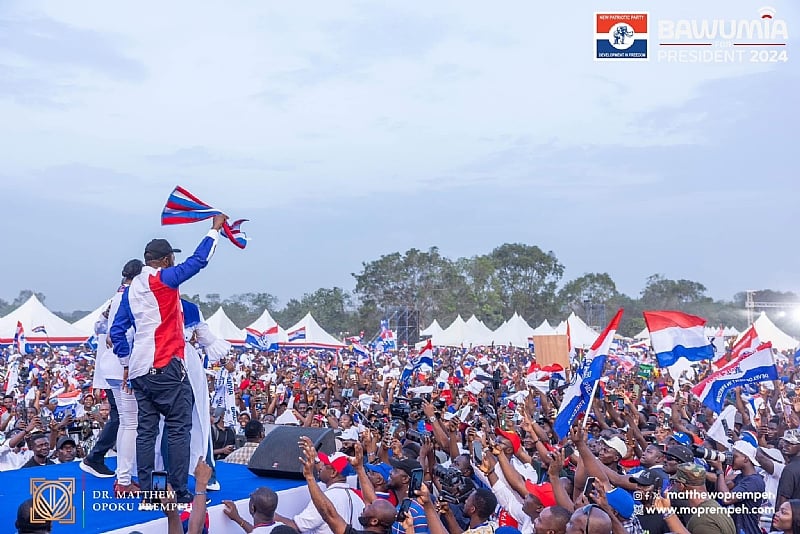Dr. Matthew Opoku Prempeh (NAPO), the 2024 running mate of the New Patriotic Party (NPP), has issued a stark warning about the party’s future prospects: internal division poses the single greatest threat to their success in the 2028 general elections. He emphasizes that unity is paramount, arguing that even the strongest flagbearer cannot compensate for a fractured party. This message, shared via social media and reiterated during a meeting with party executives, underscores the NPP’s perceived vulnerability and the urgent need for cohesion as they strategize to regain power. NAPO’s assertion is underpinned by a belief that Ghanaians are already experiencing the negative consequences of the NPP’s absence from government, a sentiment he believes can be leveraged in their favor if they present a united front. He argues that this perceived decline in governance under the NDC can serve as a powerful motivator for the electorate to return the NPP to power, but only if the party can demonstrate its own internal stability and avoid the pitfalls of factionalism.
NAPO’s concern about internal divisions within the NPP highlights a recurring challenge for political parties in Ghana and elsewhere. The competition for power and influence within a party can often lead to fragmentation and infighting, diverting resources and energy away from broader electoral goals. The history of Ghanaian politics is replete with examples of parties weakened by internal rifts, often resulting in electoral defeats. This underscores the critical importance of maintaining party discipline and presenting a united front to the electorate. NAPO’s emphasis on unity, therefore, represents a strategic understanding of the potential damage that internal discord can inflict on the NPP’s aspirations for 2028. He is effectively calling for a prioritizing of the collective good over individual ambitions.
The assertion that Ghanaians are already feeling the absence of the NPP just four months after the handover of power to the NDC serves as a key element of NAPO’s argument. This claim aims to establish a direct link between the NPP’s departure from government and a perceived decline in living standards or governance effectiveness. By highlighting these alleged shortcomings of the incumbent NDC administration, he seeks to create a sense of urgency within the NPP and rally support for their return to power. This tactic also serves to frame the 2028 elections as a choice between the perceived stability and prosperity of NPP rule and the perceived inadequacies of the current administration. Whether this perception resonates with the broader electorate remains to be seen, but it forms a central plank of NAPO’s message of unity and future electoral success.
The meeting with the Bono East Regional Chairman and constituency executives provided a platform for NAPO to deliver his message of unity directly to key party organizers. By engaging with these local leaders, he underscores the importance of grassroots organization and the crucial role they play in maintaining party cohesion. His emphasis on the responsibility of these executives to “stand firm against any forces that aim to divide us” highlights the proactive approach he advocates for preventing internal conflict. This direct engagement with party officials demonstrates a commitment to building unity from the ground up. It acknowledges the influence of local party structures and seeks to empower them to actively promote cohesion within their respective constituencies.
NAPO’s commitment to a united NPP and the “hard work ahead” signals his recognition that regaining power in 2028 will require a concerted and disciplined effort. His message goes beyond simply calling for unity; it also emphasizes the need for dedicated work and strategic planning. This suggests an understanding that electoral success is not guaranteed and requires a combination of internal cohesion and effective campaigning. The focus on hard work also serves to galvanize party members and prepare them for the challenges ahead. By setting this tone of diligence and determination, NAPO seeks to instill a sense of purpose and shared responsibility within the party ranks, ensuring that the call for unity translates into tangible action.
In conclusion, NAPO’s message centers on the critical importance of unity for the NPP’s future electoral prospects. He argues that internal divisions represent the most significant obstacle to their success in 2028, emphasizing that even the strongest flagbearer cannot overcome a fractured party. By highlighting the perceived negative impact of the NPP’s absence from government and directly engaging with party executives, he seeks to create a sense of urgency and shared purpose. His commitment to hard work and a united front underscores the understanding that reclaiming power will require a disciplined and collective effort. This call for unity, coupled with the assertion that Ghanaians are already feeling the absence of the NPP, forms the core of his message, setting the stage for the party’s campaign to regain power in 2028.














